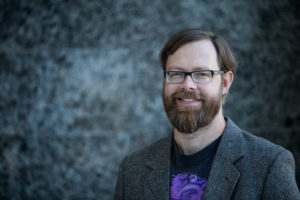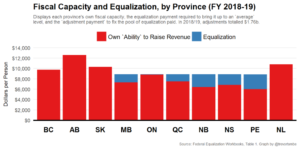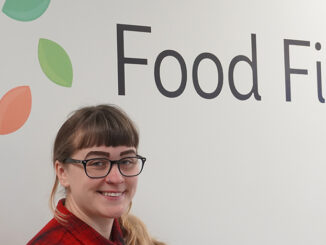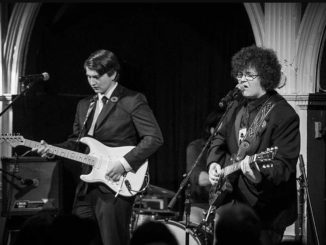The terms have and have not do very little to explain the province’s financial situation.

Andrew Waterman
Kicker
For all our financial woes – and related boondoggles – this province is still considered a have province.
That’s because when you’re a have province, you don’t necessarily have anything. The two are not related. Nor does it say anything about how the provincial government spends the money it does have.
It only means, on average, the citizens of one province pay more income taxes to the federal government than the citizens of another, simply because they either have more jobs, higher paying jobs or more economically stable industries or businesses.
Kelly Blidook, associate professor of political science at Memorial University, says the idea of have provinces paying money to have-not provinces isn’t the right way to think about it.
“There’s no equalization fund that we pay into and take out of – we all just pay our taxes,” Blidook says. “The federal government takes those taxes for its various programs and one of those programs is equalization.”
While the program itself was put in place in an effort to create a more balanced Canadian economy, speaking of it in terms of fair or not fair is missing the mark.
Blidook says Jason Kenney, the leader of the United Conservative Party of Alberta, is wrong to assert that Alberta is paying money to the rest of the country.
“You’re not giving it to other province’s, you’re simply paying your taxes and the federal government is choosing what to do with those taxes,” Blidook says.

Kenney is saying equalization is unfair to Alberta, in part, because of their rising unemployment rate.
But other federal programs include employment insurance, available to any Canadian who has worked enough insurable hours.
Being in a recession, as well, says nothing of how one province does, on average, in comparison to other provinces.
One of the most important things to keep in mind when discussing equalization is that a province doesn’t contribute – individuals do.
Criticism
In an interview on TVOntario’s The Agenda with Steve Paikin from 2010, David Mackinnon of the Frontier Centre for Public Policy, an independent public policy think tank, said services like healthcare and child care in have-not provinces are “massively superior,” and that equalization is “damaging to Canada.”
“The biggest problem, I would argue, is that (Ontario has) fewer hospital beds, fewer physicians, fewer nurses than almost all of the other province’s that we subsidize so heavily,” he said.
Unlike other federal payments to provincial governments like the Canada Health Transfer –which is spent on healthcare – a provincial government decides how the money from an equalization payment is used.
As the Department of Finance phrases it, “equalization payments are unconditional – receiving provinces are free to spend the funds according to their own priorities.”

It’s been a regular refrain from former Newfoundland and Labrador Premier Brian Peckford that being a have province is a matter of pride.
Peckford titled his 2012 autobiography Some Day the Sun Will Shine and Have Not Will be No More, words described as “immortal” on the book’s dust jacket.
In the preface to his 1982 book, The Past in the Present, Peckford writes that he believes Newfoundlanders think someone else can always do it better than them and this feeling may be deep in the psyche.
“It is sufficient to say that we have laboured under some sort of perceived inadequacy, and have more than once had our eyes turned toward the pot of gold at the end of the rainbow,” he wrote.
And he’s not the only one who thought of being a have province in these terms.
The CBC quoted Tom Marshall in 2008, when he was finance minister, as saying Newfoundlanders should prepare for a “revolution between the years” as the province was approaching have status.
Later that year, Danny Williams advised the people of the province to hold their heads high because the province was on the brink of not receiving equalization transfers.
For Blidook, it’s not that big of an issue.
“I certainly don’t take it as mattering to the same degree that Danny Williams (did),” he said. “I don’t think of it as being that important. First of all, it’s not a measure of you as an individual. Beyond that, there’s a lot of factors.”
Blidook says there may be times when we develop new economic ideas that thrive and would be an accomplishment. But based on the relevant factors – geography, economic structure, history, population, how long Newfoundland and Labrador has been a province, etc. – it’s only logical the province would be a have-not member of confederation most of the time.
“If we get lucky and we strike gold, or in this case oil, and for a while we’re (a have province) – that’s great,” Blidook said. “But beyond that, it’s a province that, structurally, institutionally, it just makes sense that it would have a harder time than other places, especially provinces like Ontario that … are on the St. Lawrence Seaway where all of the economic development occurred originally …”
Being part of a federation that looks out for you is a good thing, Blidook says. And being a have province says nothing of why, collectively, the individuals who live in a particular province may pay more.
“They don’t pay more because they’re a have province. If they pay more it’s because they have people with high incomes who are paying more in income tax.”




Be the first to comment